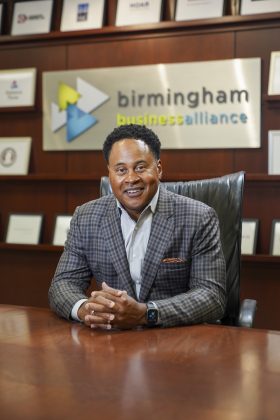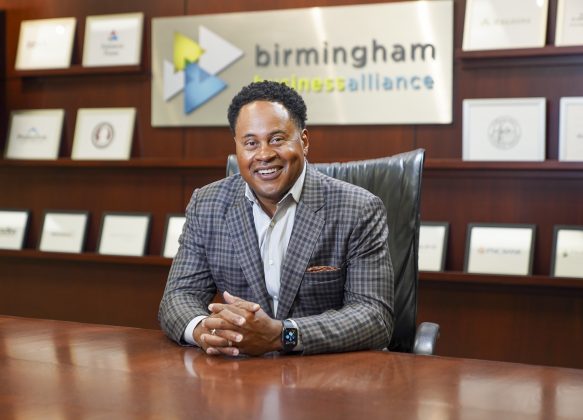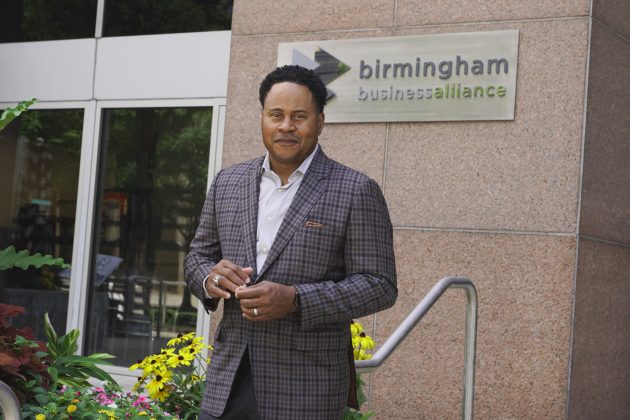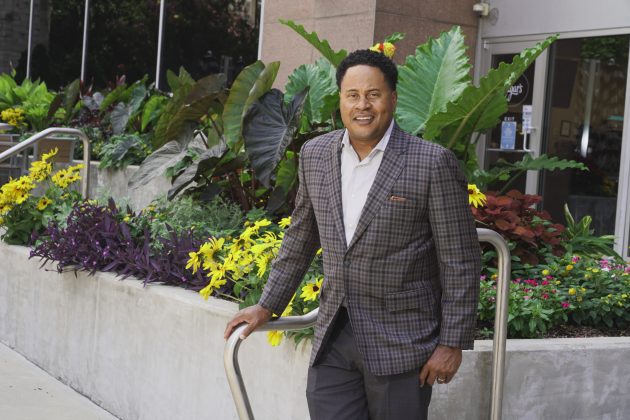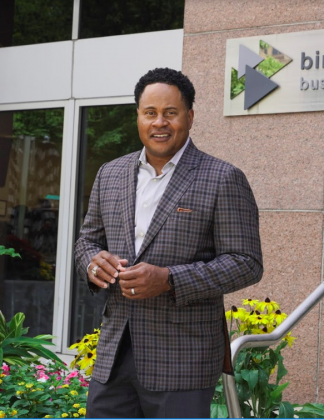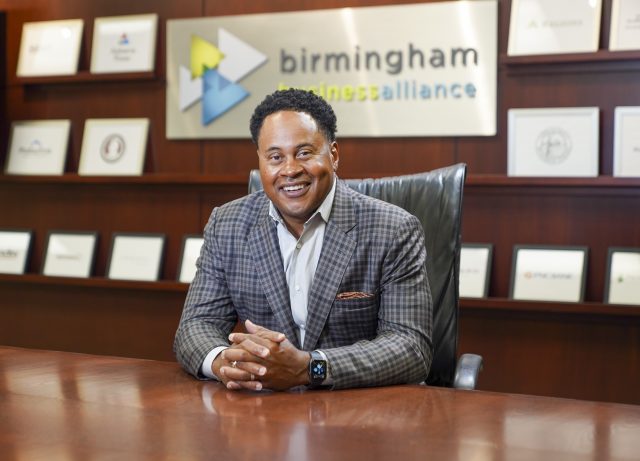
By Erica Wright
The Birmingham Times
As a professional baseball player, Kenneth “Kenny” Coleman learned about success playing midfield on a championship team. Those lessons have served him well during his 25-plus-year career as a businessman.
“[Baseball taught me that] you have to be willing and committed to working on your craft every day. It taught me the value of teamwork, that everybody on the team has a role and they need to know what it is and execute it and be committed to it for the team to be successful,” said Coleman, a second baseman and shortstop when the Birmingham Barons won the Southern League championship in 1993.
“It taught me the power of discipline; you realize that you have to be all in. … [It taught me that] there are people around you who are willing to get better, and you have to compete every day in your craft in order to be successful,” he said.
Those lessons have carried Coleman from the baseball diamond to the office of president and CEO of the Birmingham Business Alliance (BBA), the region’s leading economic development organization. He is the first African American to hold that position with the BBA and its predecessor organizations, the Birmingham Regional Chamber of Commerce and the Metropolitan Development Board (MDB).
Coleman, 53, began his new role as BBA president on July 20. He takes the reins of the organization during a challenging time, when myriad questions surround the ways businesses will maneuver through the COVID-19 pandemic.
The BBA must continue to recruit businesses but also be attentive to the health and well-being of its 20 employees, including two vacant leadership roles in economic development and public policy.
Coleman has a number of priorities for the BBA.
“First and foremost, we’re making sure our team stays safe,” he said. “We’re also finding ways to continue to be effective while working from home, trying to determine the right time to bring folks back into the office, and managing what used to be in-person events in an effective virtual way. [In addition], we’re helping to provide information to some of our businesses around how they can operate more safely.”
The next step is to find ways to recruit businesses to the area in the current climate. Coleman said his team meets with 2,000 local businesses every year “to see if there is anything we can do to help them grow, to identify what might and could drive expansion possibilities.
“There were projects afoot before things shut down in March, so we continue to make sure we stay connected with the people involved in those various projects, reminding them that Birmingham is still open for business and providing them with information as they make decisions. We continue to reach out to people involved with specific projects, as well.”
Last week, the cities of Birmingham and Bessemer along with Jefferson County jointly announced that FedEx will invest nearly $40 million in a project on Lakeshore Parkway that will create nearly 300 jobs. That’s in addition to news that the space where the Century Plaza mall once stood in East Birmingham will become a fulfillment center that will add 300 jobs to accelerate Birmingham’s last-mile delivery infrastructure. The project will invest $60 million to develop a 200,000 square foot state-of-the-art logistics facility; demolition and reconstruction are set to begin in early August.
“What you’re seeing is perhaps what the 21st century is going to look like,” Coleman said. “It’s being heavily driven by logistics … and the advanced methods to get products to people, but you also need data centers.
“I think in the future you’ll see more announcements in the vein of the two that have been made thus far. … I think it’s a glimpse into what the future of announcements will look like.”
New Jersey Native
Coleman is married to Dr. Prentiss Coleman, and they have two children: Kamden, 16, and Kyle, 13. Coleman was born and raised in Jersey City, New Jersey, where he lived with his parents, older sister, and younger brother. His mother, Mary, worked as an executive secretary, and his father, Robert, as a printing foreman.
“My parents believed in the power of education, so they sacrificed and sent my younger brother and me to great private schools, Catholic schools over the years. They really sacrificed to fund our education,” Coleman said. “We were a hardworking middle-class family. Jersey City is a very urban environment. It’s where Ellis Island and the Statue of Liberty would be if they didn’t draw the state line crooked through the Hudson River.”
Coleman learned the basics of business from his dad: “[He] always taught me to be good to the people you meet on your way up because they will be the same people you meet on your way down. I never forgot that,” he said.
“[My dad] always taught me that no matter where somebody is in their current career or life, you need to treat them with respect. That’s probably been the most paramount business lesson I’ve learned.”
Coleman played football, baseball, and basketball throughout high school.
“From the time I can remember, I played those sports,” he said. “Even today, when I go to family reunions or family functions, I have uncles and cousins who say, ‘I don’t remember you not having some sort of ball in your hand.’”
Coleman graduated from Saint Mary’s High School in 1984 and attended the University of New Haven, in New Haven, Connecticut, where he started out as a civil engineering major while playing on the baseball and basketball teams. He was named an academic All-American his senior year and eventually was elected into the school’s athletic halls of fame.
“I got halfway through my civil engineering major and realized I wasn’t sure I wanted to build roads and bridges for the rest of my life, so I ended up graduating with a communications degree,” he said.
After earning a bachelor’s degree from the University of New Haven in 1988, Coleman spent six years playing with the Chicago White Sox organization and one year with the Chicago Cubs organization. Of those six years with the White Sox, he spent two playing with their Double A affiliate team, the Birmingham Barons, where he played second base and shortstop.
“It was a great experience because I was pursuing my dreams of getting to the major leagues,” he said. “I got as high as Triple A, which is one level away from the big league, then I realized that wasn’t going to happen for me. I’m thankful that I had my education to fall back on.”
Coleman won a championship with the Barons in 1993 and in 1994 got to play with one notable teammate on the team—National Basketball League legend Michael Jordan, who played 13 months in Birmingham during a brief hiatus from basketball. Coleman jokes, “I like to say Michael Jordan got to play with me.”
Following the 1994 season, Coleman retired and stayed in Birmingham, where he began working with the MDB, the BBA’s predecessor organization.
Professional Growth
That was the starting point of his business career, which includes five years with the MDB as an economic development recruiter, a position that involved identifying companies or projects interested in relocating their operations to the Birmingham metropolitan area.
“We would identify things in their supply chain or put together incentive packages that would help them add and grow jobs,” Coleman said. “We measured our success by jobs and capital investments.”
After his stint with the MDB, in 1999 he joined Southern Company and its subsidiaries, including Alabama Power, Georgia Power, Mississippi Power, and Southern Company Gas. He served for about a year in the role of interim president and CEO for the DeKalb Chamber of Commerce in Atlanta, Georgia, where he still lives.
Hobbies
With a full work schedule, how does Coleman spend his very limited free time?
“I haven’t played nearly enough golf,” he said. “I’ve played golf all over, and I’ve been fortunate enough to play at a lot of courses.
“I do like to still get out and play basketball on occasion, but it’s not as easy as it used to be. … I also coach kids in Atlanta for both baseball and football, something I’ve done in other communities, as well.
While he doesn’t get to read or watch TV or movies too often, Coleman does have his pick of favorites he can watch or read endlessly.
“I’ve got two movies I could watch all the time, and one of them makes me laugh every time I watch it—‘Coming to America,’ [starring Eddie Murphy, Arsenio Hall, and James Earl Jones]. I can quote almost every line in [that movie],” he said. “A favorite, more serious movie is ‘Citizen Kane,’ [starring Orson Welles]. It tells the story of power and influence in a way that many movies over the course of the last 50 years have not.”
Coleman’s all-time favorite book is “To Kill A Mockingbird” by Harper Lee.
“There were times when I was living in Mobile, [Alabama], that they would do a reenactment of the book in Monroeville, Alabama, [Lee’s hometown],” he said. “I’ve had a chance to sit in the courtroom and watch the reenactment over the years. I like all the characters, so I don’t know that I have a favorite.”
When it comes to business-related books, one of his favorite authors is Malcom Gladwell, a journalist and public speaker who has written six books, including the best-seller “The Tipping Point: How Little Things Can Make a Big Difference,” published in 2000.
His guilty pleasure?
“I like to eat too much barbecue. I’m a barbecue guy, and Atlanta doesn’t have very good barbecue, so I’m an experimenter here with different sauces, seasonings, and all of that good stuff,” said Coleman. “I haven’t moved to Birmingham yet. I’m in route, though, so I’m looking for suggestions.”


